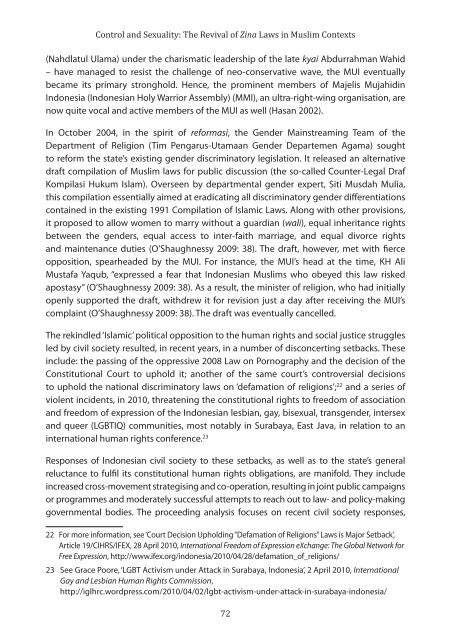control and sexuality
control and sexuality
control and sexuality
- No tags were found...
Create successful ePaper yourself
Turn your PDF publications into a flip-book with our unique Google optimized e-Paper software.
Control <strong>and</strong> Sexuality: The Revival of Zina Laws in Muslim Contexts(Nahdlatul Ulama) under the charismatic leadership of the late kyai Abdurrahman Wahid– have managed to resist the challenge of neo-conservative wave, the MUI eventuallybecame its primary stronghold. Hence, the prominent members of Majelis MujahidinIndonesia (Indonesian Holy Warrior Assembly) (MMI), an ultra-right-wing organisation, arenow quite vocal <strong>and</strong> active members of the MUI as well (Hasan 2002).In October 2004, in the spirit of reformasi, the Gender Mainstreaming Team of theDepartment of Religion (Tim Pengarus-Utamaan Gender Departemen Agama) soughtto reform the state’s existing gender discriminatory legislation. It released an alternativedraft compilation of Muslim laws for public discussion (the so-called Counter-Legal DrafKompilasi Hukum Islam). Overseen by departmental gender expert, Siti Musdah Mulia,this compilation essentially aimed at eradicating all discriminatory gender differentiationscontained in the existing 1991 Compilation of Islamic Laws. Along with other provisions,it proposed to allow women to marry without a guardian (wali), equal inheritance rightsbetween the genders, equal access to inter-faith marriage, <strong>and</strong> equal divorce rights<strong>and</strong> maintenance duties (O’Shaughnessy 2009: 38). The draft, however, met with fierceopposition, spearheaded by the MUI. For instance, the MUI’s head at the time, KH AliMustafa Yaqub, “expressed a fear that Indonesian Muslims who obeyed this law riskedapostasy” (O’Shaughnessy 2009: 38). As a result, the minister of religion, who had initiallyopenly supported the draft, withdrew it for revision just a day after receiving the MUI’scomplaint (O’Shaughnessy 2009: 38). The draft was eventually cancelled.The rekindled ‘Islamic’ political opposition to the human rights <strong>and</strong> social justice strugglesled by civil society resulted, in recent years, in a number of disconcerting setbacks. Theseinclude: the passing of the oppressive 2008 Law on Pornography <strong>and</strong> the decision of theConstitutional Court to uphold it; another of the same court’s controversial decisionsto uphold the national discriminatory laws on ‘defamation of religions’; 22 <strong>and</strong> a series ofviolent incidents, in 2010, threatening the constitutional rights to freedom of association<strong>and</strong> freedom of expression of the Indonesian lesbian, gay, bisexual, transgender, intersex<strong>and</strong> queer (LGBTIQ) communities, most notably in Surabaya, East Java, in relation to aninternational human rights conference. 23Responses of Indonesian civil society to these setbacks, as well as to the state’s generalreluctance to fulfil its constitutional human rights obligations, are manifold. They includeincreased cross-movement strategising <strong>and</strong> co-operation, resulting in joint public campaignsor programmes <strong>and</strong> moderately successful attempts to reach out to law- <strong>and</strong> policy-makinggovernmental bodies. The proceeding analysis focuses on recent civil society responses,22 For more information, see ‘Court Decision Upholding “Defamation of Religions” Laws is Major Setback’,Article 19/CIHRS/IFEX, 28 April 2010, International Freedom of Expression eXchange: The Global Network forFree Expression, http://www.ifex.org/indonesia/2010/04/28/defamation_of_religions/23 See Grace Poore, ‘LGBT Activism under Attack in Surabaya, Indonesia’, 2 April 2010, InternationalGay <strong>and</strong> Lesbian Human Rights Commission,http://iglhrc.wordpress.com/2010/04/02/lgbt-activism-under-attack-in-surabaya-indonesia/72


